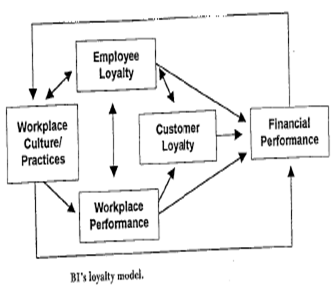Employee Loyalty=customer Loyalty
Introduction:
To create loyal employees, you need a comprehensive plan that addresses every element that produces loyalty. Armstrong BPO provides an excellent example. The elements of the performance model are evident in companies intent on creating a high-performance work environment.
Ben & Jerry's current human resource agenda:
The elements of the performance model are evident in companies intent on creating a high-performance work environment. For example, Ben & Jerry's current human resource agenda includes:
- Distributing guides for managers and employees, called, respectively, Coach's Guide and Player's Guide, to communicate the principles be-hind the company's policies.
- improving communication by.having regular leadership meetings and making leaders responsible for relaying to their people the information shared at these meetings.
- Adding training on team and cooperative work skills.
- Enhancing measurement by improving the performance appraisal process.
- Introducing a new compensation system for production workers, to reward them for acquiring certain skills and competencies.
Loyalty Model :

- Loyalty Model identifies the sources of financial performance as workplace culture and practices, employee and customer loyalty, and workplace performance.
- Each area in the model has been identified by management experts and research as important, all areas have been measured, and all linkages are supported by research.
- Workplace culture consists of the vision, values, and beliefs that define an organization.
- Employees who accept the culture translate its value to customers; employees who ignore or reject the culture create disconnects between what the company says it provides and what the customer receives.
- Workplace practices are what employees do and how they do it. Employee loyalty, as defined by BI, means that employees:
- Understand and commit to their organization's business goals and objectives.
- Make an active and ongoing decision to stay employed with the organization.
- Perform "above and beyond" behaviors to create value for customers.
- Modify their workplace behaviors to accommodate the demands of changing market environments.
Workplace performance:
- Workplace performance is the measure of how well products or services meet standards.
- "Workplace culture and practices help set and communicate standards. Employee loyalty affects how well employees adhere to those standards.
-
Based on the study, AMP views employees* satisfaction as a leading indicator of quality performance.
Higher rates of repurchase improve financial performance. As the model shows, long-term financial performance depends on workplace performance and the loyalty of employees and customers.